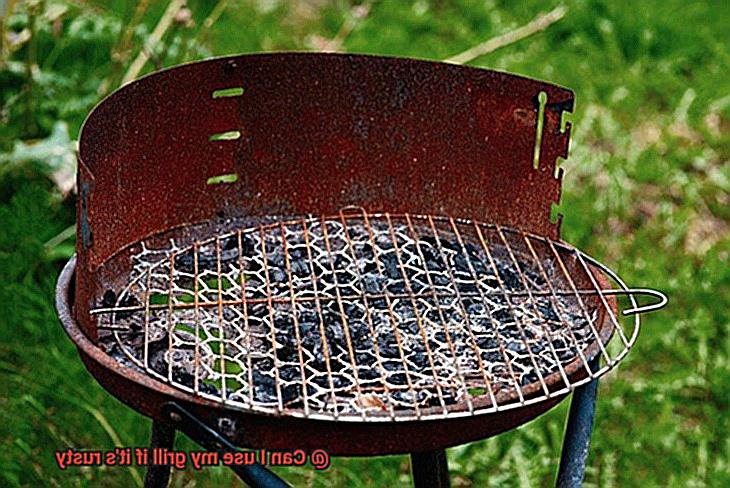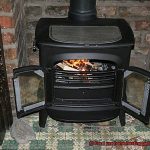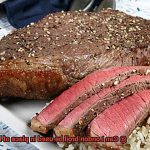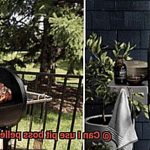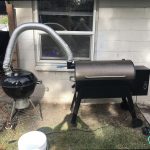It’s that time of year again – the sun is shining, and the smell of barbeque is in the air. But as you pull out your grill, you notice something alarming – rust. You might be wondering if it’s safe to use a rusty grill or if it will affect the taste of your food. Before you fire up those coals, let’s take a closer look at whether a rusty grill is still usable.
Rust is a natural process that occurs when metal is exposed to oxygen and moisture. While it may not look pretty, surface rust on your grill doesn’t necessarily mean it’s time to toss it out. However, if the rust has penetrated deep into the metal or affected critical components like the burners or grates, it could pose potential risks.
So, can you still use your rusty grill? The answer isn’t straightforward – it depends on how severe the rust damage is. Some minor rust can be safely managed with proper maintenance and cleaning. On the other hand, extensive rust damage could make your grill unsafe to use.
In this post, we’ll explore everything you need to know about using a rusty grill – from its potential health hazards to ways to prevent rust from forming in the first place. We’ll also cover how to safely clean and maintain your grill so that you can enjoy delicious barbeques all summer long without any worries. So sit back, relax, and let’s dive into this sizzling topic.
Contents
Inspecting Your Grill for Damage or Weakness
With the arrival of grilling season, it’s time to get your grill in tip-top shape for cooking up delicious meals. However, before firing up your grill, it’s crucial to inspect it thoroughly for any damage or weakness that could pose a safety hazard. Here are some essential steps to follow when inspecting your grill:
Firstly, inspect the outside of the grill for signs of rust on the body. A minor amount of rust can be removed with a wire brush and then coated with high-heat paint to prevent further damage. However, if there is extensive rust or holes in the body of the grill, it’s time to replace the entire unit.
Next, check the burners and burner tubes that connect to the gas source. Rusty or corroded burners can lead to uneven cooking or even gas leaks, which can be a significant safety concern. If you notice any damage, replace the burners before using the grill.
Now turn your attention to the cooking grates. Rusty cooking grates can affect the taste of your food and make it more challenging to cook evenly. Use a wire brush to remove any rust or debris from the grates before using the grill. If the grates are severely rusted or damaged, it’s best to replace them.
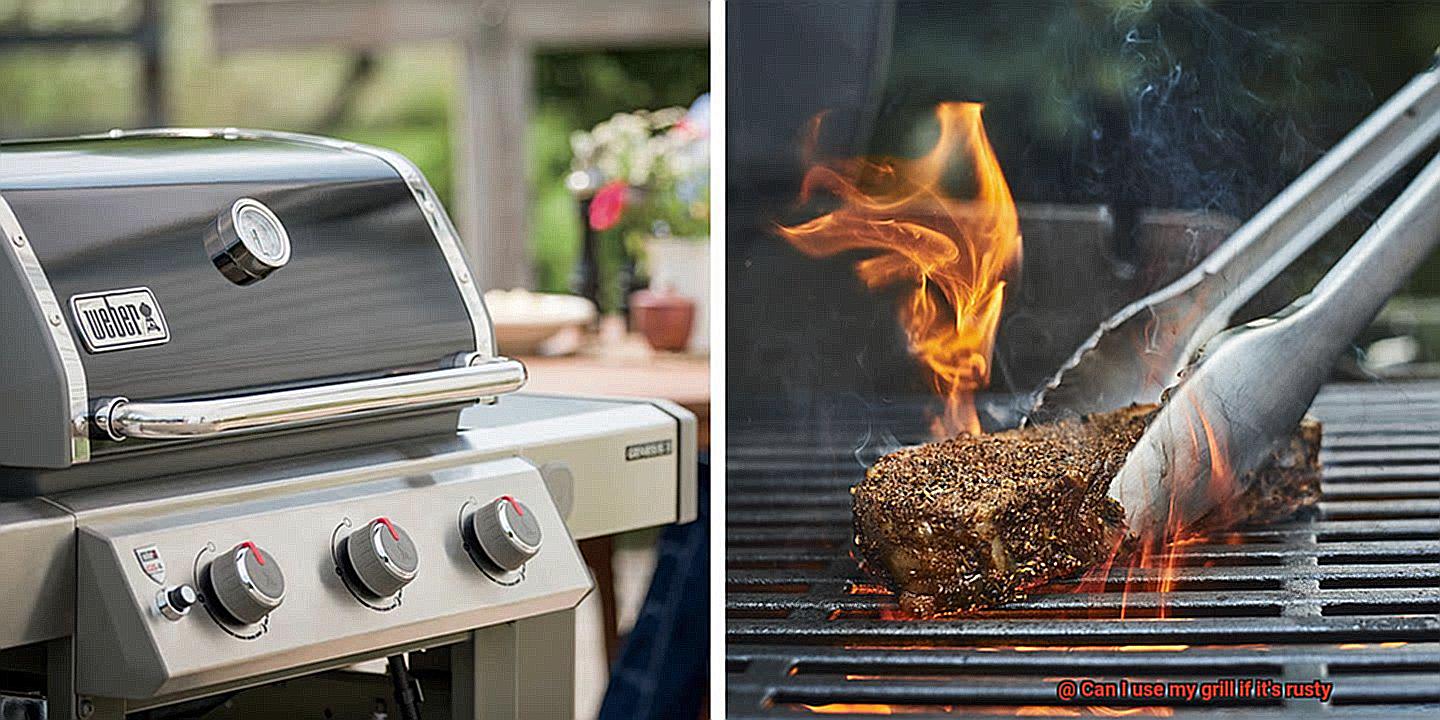
Additionally, you should consider the type of food you plan to grill. Delicate or sticky foods may be more challenging to cook properly on rusty grates. In this case, invest in new grates or coat them with a non-stick spray to prevent sticking.
Finally, practicing proper maintenance is critical in ensuring your grill remains safe and functional. Remove any excess rust or debris from the grill before use and clean it regularly to prevent buildup that could ignite during use.
Considerations When Choosing Food to Grill
Before you start cooking, it’s crucial to consider the type of food you choose to grill. Not only does it affect the taste, but it can also impact your health, especially when using a rusty grill. As an expert in this area, I have some essential considerations and tips to share with you.
Firstly, acidic foods such as tomatoes, citrus fruits, and vinegar-based marinades should be avoided when grilling on a rusty grill. The acidity can react with the rust on your grill and cause harmful chemicals to leach into your food. To avoid any potential health risks, opt for neutral or low-acidic foods like chicken, fish, or vegetables that won’t react with the rust.
Another crucial consideration is to choose lean cuts of meat to reduce the amount of fat that drips onto your rusty grill. When fat drips onto a rusty surface, it creates harmful smoke that can be absorbed by your food. To avoid this, go for leaner options and marinate them well in advance for maximum flavor.
To ensure that any food you choose to grill on a rusty grill is safe to eat, it’s essential to cook it thoroughly. Rusty grills can harbor bacteria and other harmful microorganisms that can cause food poisoning if not cooked properly. So, use a meat thermometer to ensure that your meat is cooked to the appropriate temperature before serving.
Finally, consider using a non-stick cooking spray or oil to prevent your food from sticking to your rusty grill. This not only helps in easy cleaning but also reduces the amount of smoke and harmful chemicals that could be absorbed by your food.
To summarize, here are some quick tips for choosing food to grill on a rusty grill:
- Avoid acidic foods
- Choose lean cuts of meat
- Cook thoroughly
- Use non-stick cooking spray or oil
Taking Steps to Prevent Sticking or Flare-Ups
Grilling on a rusty grill can be a daunting task, but fear not, my friends. One of the biggest challenges you will face when grilling on a rusty grill is preventing sticking and flare-ups. These pesky problems can ruin your meal and pose potential health risks. So, let’s dive into some tips and tricks to help you avoid them.
First things first, proper cleaning is essential. To remove any rust or debris from the grates before cooking, use a wire brush or scraper. If you’re dealing with stubborn buildup, soak the grates in a mixture of hot water and vinegar for an hour before scrubbing them clean. This step will ensure that your grill grates are ready for the next step.
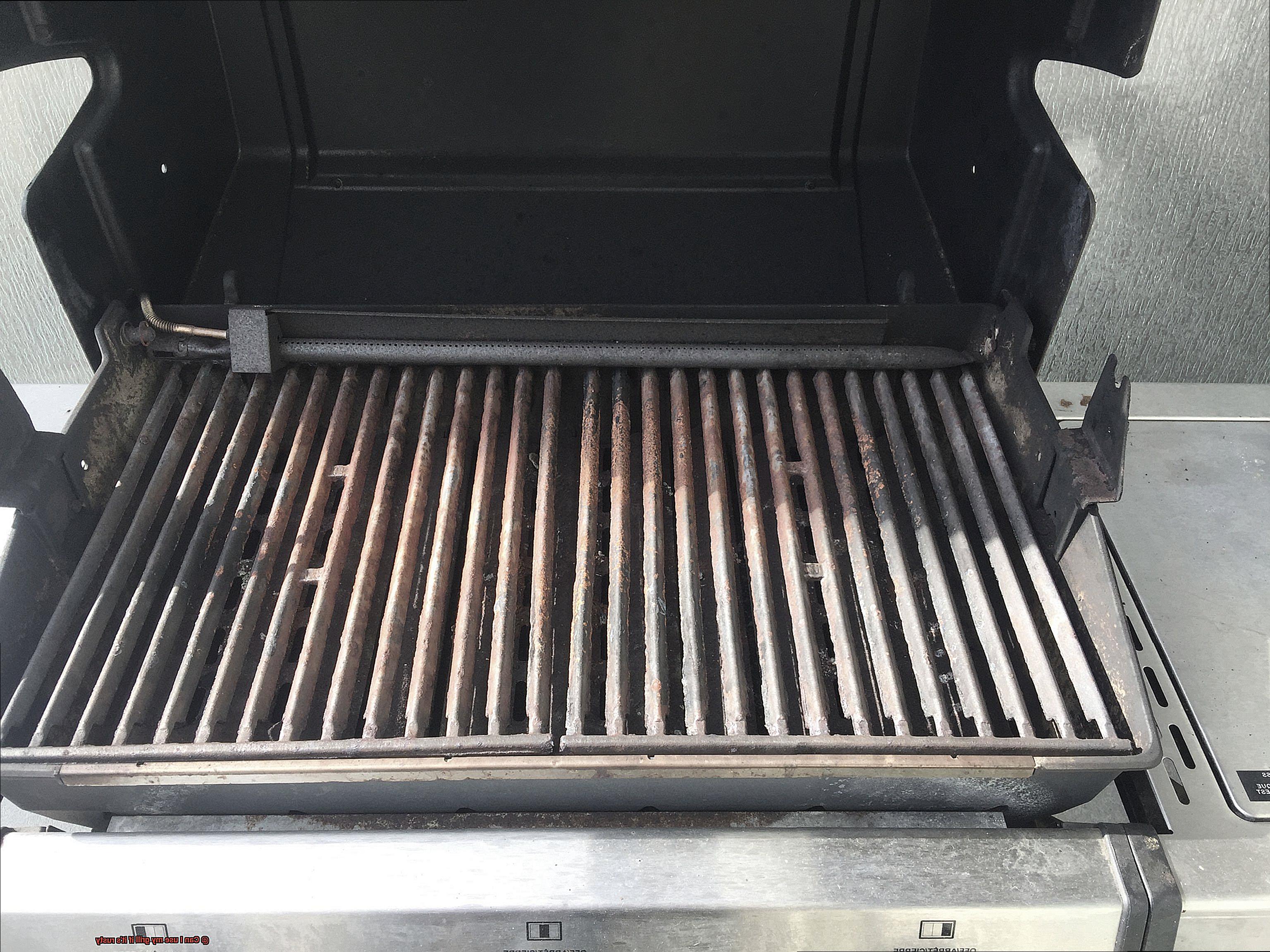
After cleaning, apply a thin layer of oil using a paper towel or brush. This will create a non-stick surface and prevent food from sticking to the grates while cooking. It’s important to keep in mind that you should apply oil only to cold grates before heating up the grill.
Maintaining your grill and keeping it free from excess grease is also crucial in preventing flare-ups. After each use, scrape off any leftover food particles and grease from the grates. Using a drip pan or foil can also help catch any excess grease that may drip down from your food.
If you’re still having issues with sticking or flare-ups, consider using a grill mat or basket. These accessories provide an additional barrier between your food and the grates, creating a more even cooking surface and preventing flare-ups.
Maintaining Your Grill Regularly to Prevent Buildup
Grilling is an art that brings people together, but it requires proper maintenance to keep your grill functioning at its best. A well-maintained grill can prevent buildup, rust, and other issues that can ruin the grilling experience. Here are some expert tips to maintain your grill regularly and ensure that it lasts for years to come.
Cleaning your grill after each use is a crucial step in maintaining it. Leftover food particles and grease on the grates can cause buildup, making future cleanings more difficult. Scraping off these particles and wiping down the exterior and interior of the grill with a damp cloth will help prevent rust from forming.
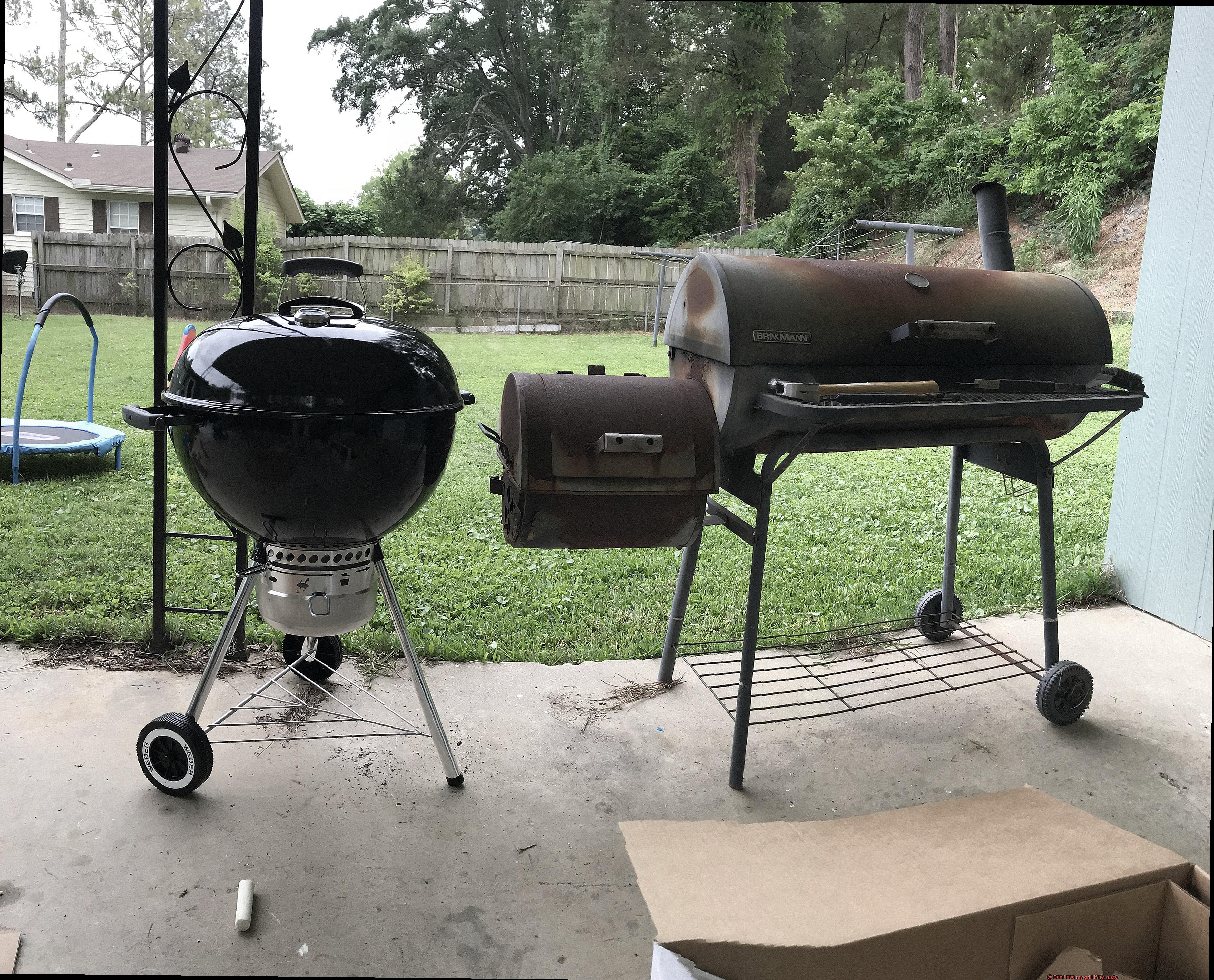
Protecting your grill from the elements is also essential. Keep it covered when not in use to prevent rain and snow from causing rust to form. Additionally, store your grill in a dry, well-ventilated area to prevent moisture buildup.
Regular inspections will help you catch any potential issues before they become major problems. Check for any signs of wear and tear, such as rust forming on the grates or other parts of the grill. If you notice any issues, address them promptly by using a wire brush or sandpaper to remove rust and applying a rust inhibitor or high-temperature paint to prevent further corrosion.
Replacing Damaged Grill Grates
Grilling is a quintessential summer activity that brings friends and family together. However, a rusty grill grate can ruin a perfectly good barbecue and even pose health risks. That’s why it’s crucial to replace damaged grill grates immediately. As an expert in the field, I’m here to guide you through the process.
Step 1: Identify the Type of Grill Grate You Need
Grill grates come in different materials such as cast iron, stainless steel, and porcelain-coated steel. Each material has its pros and cons. Cast iron grates are durable and retain heat well but require more maintenance, while stainless steel grates are low-maintenance but don’t retain heat as well as cast iron. Porcelain-coated steel grates are rust-resistant and easy to clean, but they can chip or crack over time. Identifying the type of grill grate you need is crucial before making any purchase.
Step 2: Purchase a Replacement
Once you’ve identified the type of grill grate you need, it’s time to purchase a replacement. You can find replacements at your local hardware store or online. To ensure that it fits your grill properly, measure your old grate before making a purchase.
Step 3: Remove the Old Grate
The next step is to remove the old grate from your grill carefully. This can usually be done by lifting the grate up and out of the grill without damaging any other parts of the grill.
Step 4: Place the New Grate in Position
After removing the old grate, place the new one in the same position as the old one and make sure it fits securely. You don’t want it wobbling around while cooking.
Step 5: Season Your New Grate
Before using your new grill grate for cooking, it’s essential to season it properly. Seasoning helps create a non-stick surface on the grate and prevents food from sticking. To season your new grate, coat it with vegetable oil and heat it on high for 15-20 minutes.
Using Nonstick Cooking Spray to Help Prevent Sticking
Fear not, because I have a solution that will make your grilling experience a breeze – nonstick cooking spray.
Nonstick cooking spray is an absolute game-changer when it comes to preventing food from sticking to your grill. Not only is it affordable and readily available, but it’s also incredibly easy to use. All you need is a can of nonstick cooking spray, a clean grill, and some paper towels or a cloth.
But before we delve into the benefits of using nonstick cooking spray, let’s first acknowledge the importance of replacing damaged grill grates. Rusty grates can not only ruin the taste of your food, but they can also pose health risks. Therefore, it’s crucial to replace them immediately and maintain them regularly.
Now, let’s move on to the benefits of using nonstick cooking spray:
- Creates a Slippery Surface: Nonstick cooking sprays contain a mixture of vegetable oil and lecithin that help create a slippery surface on your grill. This means that your food won’t stick to the grates, making it easier to flip and remove without leaving any residue behind.
- Easy Application: Applying nonstick cooking spray is quick and straightforward. Once you’ve thoroughly cleaned your grill with a wire brush or scraper, turn on the heat and allow it to warm up for a few minutes. Then, use a paper towel or cloth to apply a light coating of nonstick cooking spray to the grill grates.
- Affordable: Nonstick cooking sprays are affordable and can be found at most grocery stores. A single can of nonstick cooking spray can last you for many grilling sessions.
- Monitors Flare-Ups: Nonstick cooking sprays reduce the chances of grease buildup on your grill grates and help prevent flare-ups. However, it’s important to keep a close eye on your food while grilling and adjust the temperature as needed to prevent any flare-ups.
Ensuring Rust is Not Actively Flaking Off Before Use
Before igniting the grill, ensure that rust is not actively flaking off. Why? Rust can ruin the taste of your food and pose health risks if ingested.
To determine if rust is actively flaking off, conduct a simple test. First, clean the grill grates and any other metal surfaces with a wire brush or scraper. Then, wipe a paper towel over the surface of the grill. If the towel comes away with flakes of rust, then the rust is actively flaking off, and your grill should not be used until it has been properly cleaned and treated.
If you do find that rust is actively flaking off your grill, don’t worry. Follow these steps to address the problem:
- Remove as much of the loose rust as possible using a wire brush or scraper.
- Clean the grill thoroughly with soap and water and rinse it well.
Treat any remaining rust using a rust converter or inhibitor.
It’s important to note that even if rust is not actively flaking off, it can still be a problem if it has built up significantly. Built-up rust can interfere with heat distribution and make it harder to cook food evenly on the grill. Therefore, it’s crucial to regularly clean and maintain your grill to prevent rust buildup in the first place.
Benefits of Using a Rusty Grill Safely
Well, think again. A rusty grill can still be used safely with proper care and precautions. In fact, there are some surprising benefits to using a rusty grill that you may not have considered.
First, let’s talk about the flavor. The rust on your grill can actually enhance the taste of your food by creating a unique smoky flavor. Of course, this doesn’t mean you should let your grill rust purposely or ignore it when rust starts to form. You still need to take steps to clean and maintain your grill to ensure it remains safe to use.
Another benefit of using a rusty grill safely is that it can help you save money. Instead of immediately replacing your grill when it starts to rust, you can take steps to prevent further rusting and extend the life of your grill. This way, you won’t have to spend money on a new grill as often, which can be especially helpful if you’re on a tight budget.
Despite these benefits, using a rusty grill does come with some risks. If the rust is not properly cleaned and maintained, it can become a health hazard. Rust contains iron oxide, which can be harmful if ingested in large amounts. Additionally, if the rust flakes off and sticks to your food, it can cause stomach issues or even damage your digestive system over time.
To use a rusty grill safely, you need to take steps to prevent further rusting and ensure any existing rust is properly cleaned off. This includes regularly cleaning your grill with soap and water, drying it thoroughly after each use, and storing it in a dry place when not in use. You may also want to consider using a rust inhibitor or coating your grill with high-heat paint to prevent further rusting.
yuDwSi458Ro” >
Conclusion
In conclusion, the question of whether you can use a rusty grill is not a simple “yes” or “no.” It depends on the extent of the rust damage. If it’s just minor surface rust, then with proper maintenance and cleaning, you can still safely use your grill. But if there’s extensive rust damage, then it could pose a safety hazard.
To ensure your grill’s safety, it’s crucial to thoroughly inspect it for any damage or weakness before using it. Also, choosing the right food to grill on a rusty grill is essential. Avoid acidic foods and opt for lean cuts of meat that are cooked thoroughly. Additionally, using non-stick cooking spray or oil can prevent sticking.
When grilling on a rusty grill, preventing sticking and flare-ups requires proper cleaning and maintenance. You can also use a non-stick cooking spray or a grill mat/basket to prevent sticking. Regularly cleaning your grill after each use, protecting it from the elements, and inspecting for wear and tear can help prevent buildup and extend its life.
Using a rusty grill comes with some benefits such as enhancing the taste of your food and saving money by extending its life. However, it’s important to take steps to prevent further rusting and ensure any existing rust is properly cleaned off to avoid health hazards.
By following these precautions and taking proper care of your rusty grill, you can enjoy delicious barbeques all summer long without any worries.

